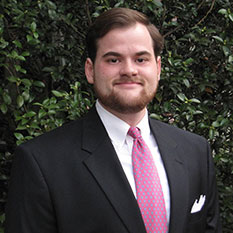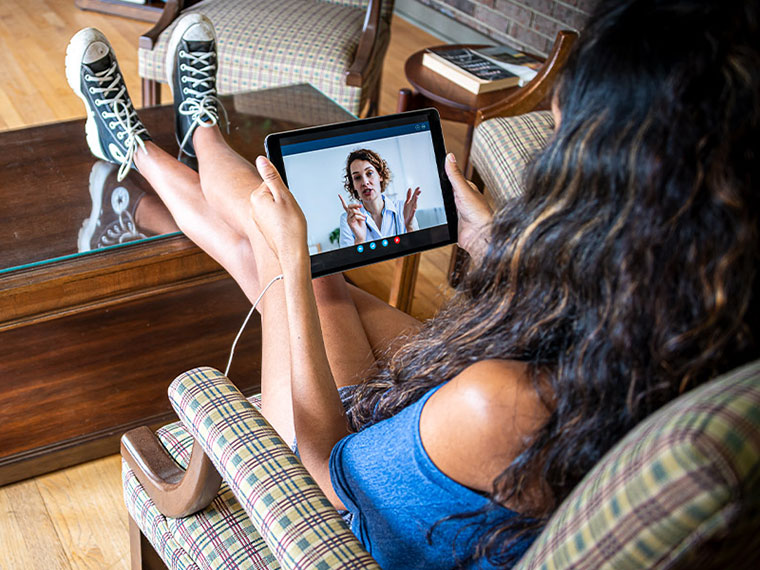The information presented on this page may be dated. It may refer to situations which have changed or people who are no longer affiliated with the university. It is archived as part of Mississippi State University's history.
Mississippi has ranked as a top state for telemedicine since 2016 when it received an A ranking on telemedicine from the American Telemedicine Association, making it one of only eight states to earn that grade at the time. In 2020, Mississippi was the top state for telemedicine according to the Mercatus Center, a market-oriented nonprofit think tank. Necessity is, indeed, the mother of invention, or in this case, innovation. Half of the state's residents live in rural areas with higher risk of injury and chronic disease in a state that ranks 49th in the number of physicians per resident with 178.6 physicians per 100,000 residents, according to the Association of American Medical Colleges. That's why Mississippi Agricultural and Forestry Experiment Station (MAFES) researchers are leveraging and improving telemedicine across the state to take better care of all Mississippians.
Dr. Will Davis, assistant professor in the Department of Agricultural Economics and MAFES scientist, is involved in two telemedicine projects aimed at improving the health of all Mississippians. The first, with the University of Mississippi Medical Center as the lead, aims to establish several resources for Mississippians struggling with a substance use disorder.
The Center for Innovation and Discovery in Addictions (CIDA) Mississippi Horizons Project is a $6 million federal grant aimed at tackling substance use disorders in Mississippi. Davis works with Dr. Jefferson Parker and Dr. James Rowlett who are the project's co-principal investigators and Erin Shirley Orey, CIDA Mississippi Horizons project manager, all with the University of Mississippi Medical Center along with Dr. Devon Mills, agricultural economics assistant professor with the MSU Extension Service.
The project includes a Tele MAT (Telemedicine-based Medication Assisted Treatment) program where patients undergo a virtual substance use disorder evaluation and receive the consultation, medications, and treatments they need from appropriate specialists. The grant also includes financial support for at home drug testing, transportation assistance for treatment-related travel, and residential substance use disorder treatment scholarships.
"For the Tele MAT program, our ability to pay for patient's medication assistance treatment is huge because annual costs can range from about $6,500 for methadone to more than $14,000 for naltrexone. Both are used to treat opioid use disorders with the latter also used for alcohol use disorder. Additionally, by providing telemedicine treatment, patients can avoid many of the often-ignored underlying costs of treatment, like having to miss work or school to get the treatment they need. This is especially important for patients in medically underserved areas that may otherwise not have access to or would have to travel long distances to get this kind of treatment," said Davis.
The team is also planning other ways to combat substance use disorders across Mississippi. Researchers are creating the Academy of Addiction Medicine, which will provide community emergency departments 7-day-a-week nighttime on-call consultation from mental health nurse practitioners and peer-support specialists (trained individuals in active recovery who have experienced substance use disorder firsthand). The academy will also provide addiction medicine education for health care providers, patients, and families, including a conference for healthcare providers in July 2023 focused on how medical marijuana legalization in Mississippi impacts substance use disorders across the state. The project is also developing Find Help Now Mississippi, a public-facing registry of substance use disorder treatment facilities with real time information on what kind of treatment and availability facilities have.
"Patients will be able to put information in about their specific substance use disorder and location to find the best match for their needs, all in one place. This keeps people who are already struggling from having to wade through a currently difficult landscape of information spread all over the place," Davis said.
Davis will help quantify the project's efficacy from an economic standpoint. "We measure marketing efforts to determine what compels patients to utilize services. We're also assessing patient success determinants and the program's overall economic costs and benefits. Our goal is to find a way for the program to be cost-effective and economically sustainable over the long run," he said. Davis looks forward to the impact the program will make.
"I'm most excited about the real impact this grant will have on the lives of Mississippians battling addiction," he said. "I want people who are struggling with addiction or who may have a loved one battling the disease to know that help is out there, and you or your loved ones deserves treatment."
Orey, the CIDA Mississippi Horizons project manager, said MSU will help the team grow and sustain the program into the future.
"While the University of Mississippi Medical Center (UMMC) is on the clinical side, Mississippi State health economists will quantify our work in dollars. This includes figuring out the potential savings of assisting people so they can get back to their lives and back into the workforce. How it alleviates the financial burden for the patient but also the state, emergency rooms, hospitals, families, and so on. When the untreated are showing up in emergency rooms in poor condition, how does our program alleviate the trickle-down effect?" she said.
Orey said the program is already changing the lives of Mississippians struggling with the disease as well as their families.
"Thus far, we've helped 40 patients with the number growing every week. The best thing about this program is hearing the testimonials from so many patients and their family members who were struggling and are grateful for the help. So many people benefit from it, not just the patients, but also family members that have been supportive of them," she said.
The second project Davis is involved in, which includes Dr. Ayoung Kim, agricultural economics assistant professor and MAFES scientist, seeks to identify the determinants to telemedicine utilization among adults in Mississippi. Researchers are assessing broadband access and quality, socioeconomic and demographic characteristics, local healthcare access, and health status. Davis said identifying these factors and barriers that determine telemedicine use across the state will help inform policy that improves telemedicine access for all Mississippians.
"While Mississippi telemedicine policy is supportive of patient access, certain patients may still face barriers to telemedicine utilization. Differences in these barriers have the potential to widen gaps in healthcare access and health disparities among disadvantaged groups. Identifying telemedicine utilization determinants and barriers is key to designing policies focused on improving healthcare access through telemedicine," Davis said.
Broadband access, for instance, is typically required to access telemedicine services and Mississippi leads the nation with the highest percentage of the population without access to broadband at 19.7% statewide, according to a recent MSU Extension report. The number jumps to 28.2% for Mississippi's rural population. The team surveyed Mississippians online across the state and produced a phone version to reach residents with limited or no broadband access. Preliminary results indicate telemedicine utilization rates change depending on patient health status. "Individuals with worse self-reported mental health are found to use telemedicine more often than mentally healthy individuals. This may be driven by the increasing availability of virtual psychological and psychiatric treatment programs we have seen happening across the country, particularly virtual therapy and counseling platforms. We also find that people with multiple medical diagnoses use telemedicine more than those with one or no diagnoses," he said. They also found that people who go to the doctor more in-person have a greater chance of using telemedicine services, too.
"This suggests that both types of care may be complements instead of substitutes, highlighting the role telemedicine can play in supporting our traditional healthcare system," he added.
Age, access to insurance, and owning a vehicle also play a role with the insured more likely to access telemedicine and older individuals and car owners less likely to do so. The type of internet might also have an impact.
"We found that patients that rely on satellite or mobile hotspot for internet are more likely to use telemedicine. We still have a lot to do on the internet side of things, but this may suggest a difference in utilization by internet type," he said.
Davis pointed out that understanding telemedicine utilization determinants are vital to advancing telemedicine policy.
"Policymakers always need information from studies like ours to design effective and efficient policy. One of the main reasons why is that to expand telemedicine utilization in our state, we need to know what mechanisms to target. For example, if things like local broadband access and quality or local healthcare access are driving utilization, we need to target technological and healthcare infrastructure. If most of the differences in utilization are driven by individual or community level characteristics, however, that suggests that public health and educational interventions may be a better use of resources. In general, we always have the goal of helping to inform effective policy that can do the best job of helping people in our state," he said."
The CIDA Mississippi Horizons Project is funded through a Congressional Directive Funding appropriation awarded through the Substance Abuse and Mental Health Services Administration (SAMHSA). The telemedicine project was funded by UMMC's Mississippi Center for Clinical and Translational Research.
I'M Most Excited About The Real Impact This Grant Will Have On The Lives Of Mississippians Battling Addiction. I Want People Who Are Struggling With Addiction Or Who May Have A Loved One Battling The Disease To Know That Help Is Out There, And You Or Your Loved Ones Deserve Treatment
Dr. Will Davis
Behind the Science

Will Davis
Assistant Professor
Education: B.S., Economics, The University of Alabama at Birmingham; M.A., Ph.D., Economics, Georgia State University
Years At MSU: 3
Focus: Health economics, food policy, and econometrics
Passion At Work: I am passionate about working toward a world where every person in every place has what they need to live their best life. Specifically, how can we use science, policy, and healthcare to make improvements in the lives of those that need it most?

